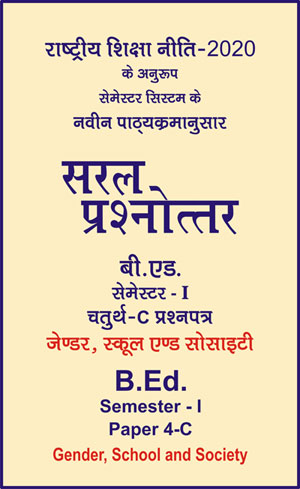|
बी एड - एम एड >> बी.एड. सेमेस्टर-1 प्रश्नपत्र-IV-C - जेण्डर, स्कूल एण्ड सोसाइटी बी.एड. सेमेस्टर-1 प्रश्नपत्र-IV-C - जेण्डर, स्कूल एण्ड सोसाइटीसरल प्रश्नोत्तर समूह
|
|
||||||
बी.एड. सेमेस्टर-1 प्रश्नपत्र-IV-C - जेण्डर, स्कूल एण्ड सोसाइटी (अंग्रेजी भाषाा में)
Question- What provision has been made for transgender by the court?
Related Short Answer Questions
- Who are transgenders? Explain in simple words.
- Under which articles, transgender persons have equal rights and protections?
Answer -
Transgender are those persons who have to face discrimination for life because earlier their gender identity was not recognized by law or society and they were forced to write male or female against their gender. The Supreme Court of India recognized transgenders as the third gender in order to eliminate the discrimination faced by them and protect their rights. The court asked the Centre to treat transgenders as a socially and economically backward class and allow them to get admission in educational institutions and employment on the basis of their third gender category.
In the landmark judgment of National Legal Services Authority Vs Union of India, the third gender got legal recognition in the eyes of law, as the Hon’ble Supreme Court ruled that fundamental rights should be available to the third gender in the same way as they were granted to men and women. The court provides equal rights and protection to transgenders under Article 14, Article 15, Article 16 and Article 21. The court emphasized the importance of the right to dignity and gave due recognition to their gender identity, which was based on the sex being reassigned after undergoing sex reassignment surgery, as recognition of the individual as either male or female. Thus transgenders are entitled to legal protection in all spheres of state activity, including education and employment.
The rule of law is supreme and all are equal in the eyes of law in India. Nevertheless, the transgender community is in a constant battle as they have to fight harassment, abuse and discrimination from every section of the society, be it their own family and friends or the society at large. The life of transgender people is a daily battle as they are not accepted anywhere and are ostracized and ridiculed by the society.
However, in the case of National Legal Services Authority v. Union of India & Ors [Writ Petition (Civil) No.:400 2012 (NALSA)], the Supreme Court of India, Justices K.S. Radhakrishnan and A.K. Sikri in their leading judgment and the third gender was recognized along with the female. By recognizing diverse gender identities, the Court has exposed the dual gender structure of ‘male’ and ‘female’, which is recognized by the society.
“Recognition of transgenders as third gender is not a social or medical issue, but a human rights issue”, Justice KS Radhakrishnan told the Supreme Court while delivering the verdict.
Before the law under Articles 14 and 21 of the Constitution, right to equality and equal protection of law are guaranteed. The right to choose one’s gender identity is an essential part of living with dignity, which again comes under the purview of Article 21. Right to individual liberty and self-determination, while determining that, the Court held that - “The gender to which a person belongs is to be determined by the person concerned.” The Supreme Court has given the right of gender identity to the people of India.
Furthermore, they cannot be discriminated against on the basis of gender as it is a violation of Article 14, Article 15, Article 16 and Article 21.
The Court also protects any gender expression enforced by Article 19(1)(a) and holds that “one’s personal appearance or choice of clothing shall be subject to the restrictions contained in Article 19(2) of the Constitution”. But no restriction can be imposed."
The Court recognized the right to behave in the individual, personality and free thought process of man, which is essential for the full development of the individual’s personality. The Court further held that a person shall not realize his dignity if he is forced to mature into the sex to which he does not belong or cannot belong, or which is again hinder in his development.
The Supreme Court has given some directions to protect the rights of transgender persons by including third category in documents like election card, passport, driving license and ration card and for admission in educational institutions, hospitals.
|
|||||

 i
i 









